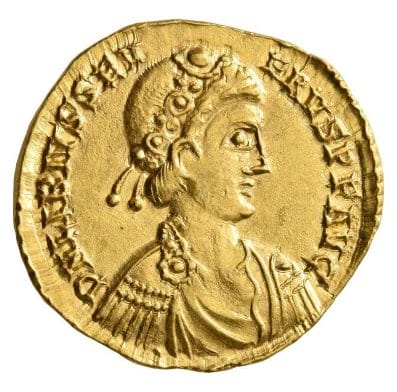Last Updated on November 27, 2023 by Vladimir Vulic
Life: AD ? – 465

- Became emperor AD 461.
- Died on 14 November AD 465 at Dertona.
After the death of Majorian there followed a period of over three months where no successor was named for the throne of the western empire.
Then on 19 November AD 461 Libius Severus was proclaimed emperor.
Little is known about Libius Severus’ origins and career, other that he came from Lucania in the southwest of Italy.
He was evidently a puppet emperor, controlled by the powerful German ‘Master of Soldiers’ Ricimer, who had dominated policy of the western empire ever since the reign of Avitus.
But the reign of Libius Severus was a much disputed one. Leo, emperor of the east, was unwilling to accept his appointment. So too did general Aegidius, who was ‘Master of Soldiers’ in Gaul and commanded a large army there, refuse to recognize him.
Meanwhile the military commander of Dalmatia, though this territory belonged to the eastern empire, was an old enemy of Ricimer called Marcellinus, displayed open hostility (much encouraged by Leo) against the puppet emperor.
Acting on the wishes of the eastern empire, the Vandals then also declared themselves openly hostile to Libius Severus. Instead of the current unwanted emperor the Vandal king Geiseric proposed Olybrius (who was to become emperor in AD 472).
With such threats arising from the Vandals in the south and Marcellinus in Dalmatia, Ricimer rushed back from his victory over the Alans at Bergomum (Bergamo) in northern Italy. He found himself in the humiliating position of having to ask Leo to persuade them to abandon their threats toward the west.
Marcellinus agreed to calm matters down but Geiseric and his Vandals only further intensified their efforts, launching major raids on Sicily and Italy.
Libius Severus died on 14 November AD 465. The circumstances of his death are unclear, but the rumour that Ricimer had him poisoned is most likely true.

Historian Franco Cavazzi dedicated hundreds of hours of his life to creating this website, roman-empire.net as a trove of educational material on this fascinating period of history. His work has been cited in a number of textbooks on the Roman Empire and mentioned on numerous publications such as the New York Times, PBS, The Guardian, and many more.
